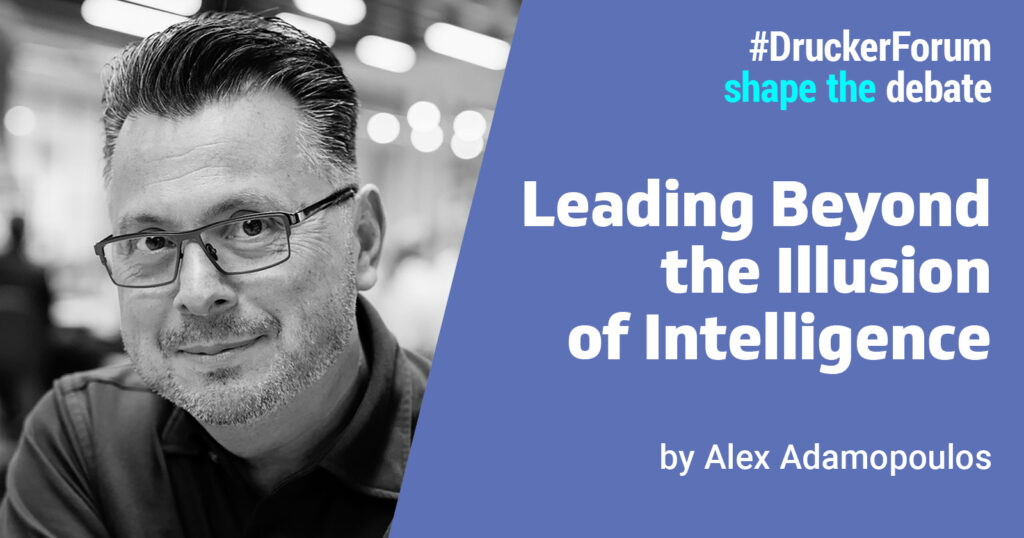
“The true mark of leadership is outcomes, not attributes.” — Peter Drucker
We’ve reached a strange moment in business where intelligence itself is overrated. Everywhere you turn, companies are proclaiming their “AI-first” future, yet few can explain what that actually means in practice. The illusion isn’t in the technology; it’s in the belief that AI, by its mere presence, will fix what’s broken in how we work, lead, and learn.
What’s being revealed today isn’t a technology gap; it’s a leadership gap.
Drucker’s insight that outcomes, not personality, measure leadership feels prophetic in this moment. AI has become the mirror that reflects our collective management weaknesses. The question is no longer whether AI can think; it’s whether leaders can.
From Commanders to Conductors
The leadership style that built the post-war corporation won’t lead us into the next era. It was hierarchical, centralized, and personality-driven, a world of moguls and managers. But those conditions no longer exist.
Information (digital) is democratized. Talent is mobile. Transaction costs have collapsed. The world no longer needs commanders; it needs conductors—leaders who can orchestrate many independent minds into one shared direction.
As the Drucker Forum frames it, leadership is not a noun—it’s a verb. It’s a continuous act of aligning people toward purpose through clarity, trust, and accountability.
AI emphasizes this truth. Technology can automate tasks and clarify choices, but it cannot replace judgment, empathy, or moral courage. Those qualities remain uniquely human. The leaders who will succeed are those who can balance the logic of machines with the wisdom of people. Leadership now means orchestrating the relationship between human wisdom and machine intelligence, knowing when to rely on the algorithm and when to override it.
The Discipline Behind the Hype
Andrew Ng once called AI “the new electricity.” He’s right—but electricity didn’t change the world just because it existed. It changed the world because businesses learned to build systems around it.
The same applies to AI today. The winners of this era will not be those with the flashiest models or largest datasets, but those who treat AI as a disciplined craft.
Eric Schmidt often said that innovation without operating rigor is chaos. The same rule applies now: every AI initiative must start with a defined customer problem, a measurable outcome, and clear accountability for results. Scaling AI is not a creative sprint; it’s an exercise in operational maturity.
The best organizations are quietly moving from projects to products. They’re no longer chasing automation for efficiency’s sake; they’re building systems that continuously learn, adapt, and improve. In those environments, “AI-first” means customer-first, evidence-first, and outcome-first. The future belongs to leaders who can operationalize intelligence, not just admire it.
People Are the Platform
Despite the enthusiasm around machine learning, we often overlook the importance of human development. AI can speed up many processes, but it can’t quicken leadership growth.
The biggest barrier to progress isn’t a shortage of data; it’s a lack of development. Many organizations pour millions into technology while underfunding their managers. The outcome is predictable: transformation burnout, missed goals, and excessive turnover.
The most resilient organizations treat training as a core part of their plan—funded, assessed, and directly linked to performance results. They develop leadership skills as intentionally as they develop software.
Transformation burnout doesn’t stem from too much change; it results from poorly led change. When goals are vague, the pace is relentless, and support is lacking, people lose engagement. Drucker might have called that a failure of stewardship.
The purpose of an organization is to leverage human strengths and make human weaknesses insignificant. That purpose remains the same; it’s just more challenging to accomplish without intentional learning.
The Scoreboard for the Next Era
Jim Collins taught us that greatness is built on disciplined people, disciplined thought, and disciplined action. Those three disciplines will define the next decade of leadership.
The new scoreboard for leaders won’t be vanity metrics or short-term growth. It will be contribution margin from intelligence—the measurable value that results from combining human insight and AI capability.
Great leaders will frame problems rigorously, fund initiatives based on evidence, and build cultures where curiosity exceeds fear. They won’t chase trends; they’ll cultivate judgment. They won’t manage by quarter; they’ll lead by conviction.
We are moving beyond the age of intelligent tools and entering the age of intelligent organizations—places where leadership is shared, learning is ongoing, and technology serves purpose, not ego.
The illusion of intelligence ends when leaders start practicing it.
About the author:
Alex Adamopoulos is chairman and CEO of Emergn

